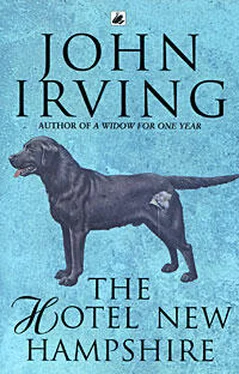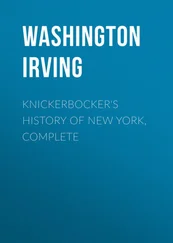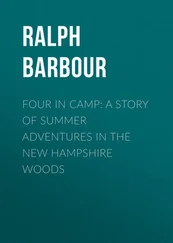“ Nein! Nein! You dumb bear!”
And State o’Maine, his expression under the muzzle a mystery to the guests, drove forward, turning only slightly, hulking over the handlebars.
“You stupid animal!” Freud cried.
The bear drove away—always through a party tent without striking a support pole or snagging the white linen tablecloths that covered the tables of food and the bar. He was pursued by waiters over the rich expanse of lawn. The tennis players cheered from the courts, but as the bear drew nearer to them, they abandoned their game.
The bear either knew or didn’t know what he was doing, but he never hit a hedge, and he never went too fast; he never drove down to the docks and attempted to board a yacht or a lobster boat. And Freud always caught up with him, when it seemed that the guests had seen enough. Freud mounted the cycle behind the bear; hugging himself to the broad back, he guided the beast and the ’37 Indian back to the lawn party.
“So, a few kinks to work out!” he’d call to the crowd. “A few flies in the ointment, but nichts to worry! In no time he will get it right!”
That was the act. It never changed. That was all Freud had taught State o’Maine; he claimed it was all that the bear could learn.
“He’s not so smart a bear,” Freud told Father. “I got him when he was too old. I thought he’d be fine. He was tamed as a cub. But the logging camps taught him nothing. Those people have no manners, anyway. They’re just animals, too. They kept the bear as a pet, they fed him enough so he wouldn’t get nasty, but they just let him hang around and be lazy. Like them. I think this bear’s got a drinking problem because of them loggers. He don’t drink now—I don’t let him—but he acts like he wants to, you know?”
Father didn’t know. He thought Freud was wonderful and the 1937 Indian was the most beautiful machine he had ever met. On days off, my father would take my mother driving on the coast roads, the two of them hugged together and cool in the salt air, but they were never alone: the motorcycle could not be driven away from the Arbuthnot without State o’Maine in the sidecar. The bear went berserk if the motorcycle tried to drive away without him; it was the only event that could make the old bear run. A bear can run surprisingly fast.
“Go ahead, you try to get away,” Freud told Father. “But better push it down the driveway, all the way out to the road, before you start the engine. And the first time you try it, don’t take poor Mary with you. Wear lots of heavy clothes, because if he catches you, he’ll paw you all over. He won’t be mad—just excited. Go on, try it. But if you look back, after a few miles, and he’s still coming, you better stop and bring him back. He’ll have a heart attack, or he’ll get lost—he’s so stupid.”
“He don’t know how to hunt, or anything. He’s helpless if you don’t feed him. He’s a pet, he’s not a real animal no more. And he’s only about twice as smart as a German shepherd. And that’s not smart enough for the world, you know.”
“The world?” Lilly would always ask, her eyes popping.
But the world for my father, in the summer of ’39, was new and affectionate with my mother’s shy touches, the roar of the ’37 Indian and the strong smell of State o’Maine, the cold Maine nights and the wisdom of Freud.
His limp, of course, was from a motorcycle accident; the leg had been set improperly. “Discrimination,” Freud claimed.
Freud was small, strong, alert as an animal, a peculiar colour (like a green olive cooked slowly until it almost browned). He had glossy black hair, a strange patch of which grew on his cheek, just under one eye: it was a silky-soft spot of hair, bigger than most moles, at least the size of an average coin, more distinctive than any birthmark, and as naturally a part of Freud’s face as a limpet attached to a Maine rock.
“It’s because my brain is so enormous,” Freud told Mother and Father. “My brain don’t leave room on my head for hair, so the hair gets jealous and grows a little where it shouldn’t.”
“Maybe it was bear hair,” Frank said once, seriously, and Franny screamed and hugged me around the neck so hard that I bit my tongue.
“Frank is so weird!” she cried. “Show us your bear hair, Frank.” Poor Frank was approaching puberty at the time; he was ahead of his time, and he was very embarrassed about it. But not even Franny could distract us from the mesmerizing spell of Freud and his bear; we children were as caught up with them as my father and mother must have been that summer of 1939.
Some nights, Father told us, he would walk my mother to her dorm and kiss her good night. If Freud was asleep, Father would unchain State o’Maine from the motorcycle and slip his muzzle off so the bear could eat. Then my father would take him fishing. There was a tarp staked low over the motorcycle, like an open tent, which protected State o’Maine from the rain, and Father would leave his fishing gear wrapped in the flap of that tarp for these occasions.
The two of them would go to the Bay Point dock; it was beyond the row of hotel piers, and choppy with lobster boats and fishermen’s dinghies. Father and State o’Maine would sit on the end of the dock while Father cast what he called spooners, for pollack. He would feed the pollack live to State o’Maine. There was only one evening when there was an altercation between them. Father usually caught three or four pollack; that was enough—for both Father and State o’Maine—and then they’d go home. But one evening the pollack weren’t running, and after an hour without a nibble Father got up off the dock to take the bear back to his muzzle and chain.
“Come on,” he said. “No fish in the ocean tonight.”
State o’Maine wouldn’t leave.
“Come on!” Father said. But State o’Maine wouldn’t let Father leave the dock, either.
“Earl!” the bear growled. Father sat down and kept fishing. “Earl!” State o’Maine complained. Father cast and cast, he changed spooners, he tried everything. If he could have dug for clam worms down on the mud flats, he could have bottom-fished for flounder, but State o’Maine became unfriendly whenever Father attempted to leave the dock. Father contemplated jumping in and swimming ashore; he could sneak back to the dorm for Freud, then, and they could come recapture State o’Maine with food from the hotel. But after a while Father got into the spirit of the evening and said, “All right, all right, so you want fish? We’ll catch a fish, goddamn it!”
A little before dawn a lobsterman came down to the dock to put out to sea. He was going to pull his traps and he had some new traps with him to drop, and—unfortunately—he had bait with him, too. State o’Maine smelled the bait.
“Better give it to him,” Father said.
“Earl!” said State o’Maine, and the lobsterman gave the bear all his baitfish.
“We’ll repay you,” Father said. “First thing.”
“I know what I’d like to do, ‘first thing,’” the lobsterman said. “I’d like to put that bear in my traps and use him for bait. I’d like to see him et up by lobsters!”
“Earl!” said State o’Maine.
“Better not tease him,” Father told the lobsterman, who agreed.
“ Ja , he’s not so smart, that bear,” Freud told Father. “I should have warned you. He can be funny about food. They fed him too much at the logging camps; he ate all the time—lots of junk. And sometimes, now, he just decides he’s not eating enough—or he wants a drink, or something. You got to remember: don’t ever sit down to eat yourself if you haven’t fed him first. He don’t like that.”
Читать дальше












